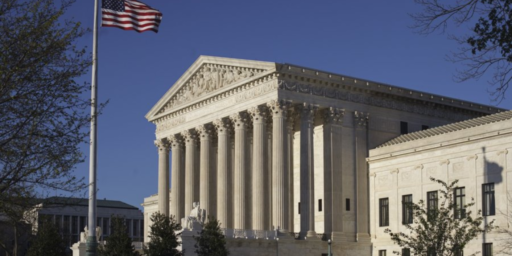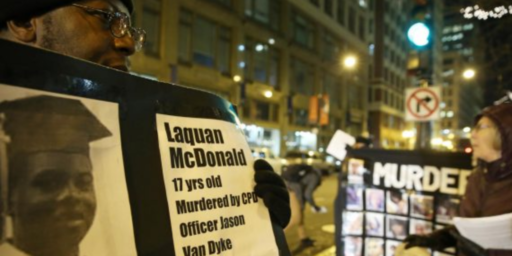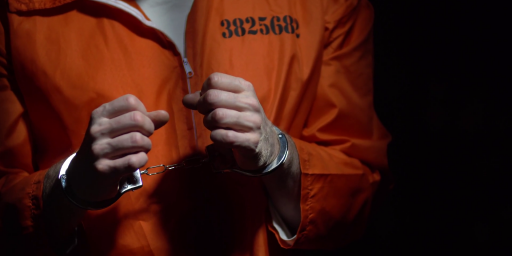Supreme Court: No Mandatory Life Without Parole For Juveniles
Today, the Supreme Court decided that mandatory life sentences for juveniles violate the 8th Amendment.
The first opinion that the Supreme Court handed down this morning raised the interesting issue of whether a juvenile, which in the cases before the Court on the matter meant a fourteen year old, could be sentenced to mandatory life without parole. It’s a case that is reminiscent of the 2005 case in which the Supreme Court had ruled that a person could not be put to death for a crime committed when they were under 18, overturning the laws of 19 states at the time. Two years ago, the Court also ruled that juveniles cannot be sentenced to life without parole in cases not involving a homicide. In this particular case, which was actually two cases, involved fourteen year old boys who had both been convicted of capital murder and sentenced to life without parole under sentencing laws that made that a mandatory sentence, meaning that neither the Judge nor the Jury had any discretion in the matter. Today, the Supreme Court ruled that the 8th Amendment bars the imposition of a mandatory life without parole sentence when the Defendant is a juvenile:
WASHINGTON (AP) — The Supreme Court ruled Monday that it is unconstitutional for states to require juveniles convicted of murder to be sentenced to life in prison without possibility of parole.
The 5-4 decision is in line with others the court has made, including ruling out the death penalty for juveniles and life without parole for young people whose crimes did not involve killing. Monday’s decision left open the possibility that judges could sentence juveniles to life without parole in individual cases of murder, but said state laws cannot automatically impose such a sentence.
We “hold that mandatory life without parole for those under the age of 18 at the time of their crimes violates the Eighth Amendment’s prohibition on ‘cruel and unusual punishment,'” said Justice Elena Kagan, who wrote the opinion for the majority.
She was joined in that opinion by Justices Anthony Kennedy, Ruth Bader Ginsburg, Stephen Breyer and Sonia Sotomayor.
Chief Justice John Roberts and justices Antonin Scalia, Clarence Thomas and Samuel Alito dissented.
“Neither the text of the Constitution or our precedent prohibits legislatures from requiring that juvenile murderers be sentenced to life without parole,” Roberts said.
It’s worth noting that, in both cases, neither Miller nor Jackson committed the crime alone, although both clearly participated in both the robbery and the murder that were a part of it. The decision itself broke down on rather predictable ground, with Justice Kennedy joining Justices Kagan, Sotomayor, Breyer and Ginsburg with Justice Scalia, Justice Thomas, Justice Alito, and the Chief Justice in dissent:
Tejinder Singh describes the Court’s ruling:
The Court’s opinion brings together two strands of precedent to hold that a mandatory life-without-parole sentence for juveniles violates the Eighth Amendment. The first strand holds that the Eighth Amendment categorically prohibits punishments that enact a mismatch between the culpability of a class of offenders and the severity of the penalty. Citing, among cases, Roper and Graham, the Court explains that juveniles have always been regarded as less culpable because the distinctive attributes of youth diminish the penological justifications for imposing the harshest penalties on juvenile offenders, even when they commit severe crimes. The second line of precedent holds that life without parole shares key characteristics with the death penalty, and thus raises similar Eighth Amendment concerns, most notably that defendants are entitled to individualized consideration when facing such a severe sanction.
Weaving these two lines of precedent together, the Court held that mandatory life without parole violates the Eighth Amendment. Such sentencing regimes, the court explained, “preclude a sentence from taking account of an offender’s age and the wealth of characteristics and circumstances attendant to it,” including “immaturity, impetuosity, and failure to appreciate risks and consequences,” as well as the juvenile’s “family and home environment,” and the circumstances of the offense, including “the extent of his participation in the conduct and the way familial and peer pressures may have affected him.” By eliding these key factors, mandatory life without parole “poses too great a risk of disproportionate punishment.” The Court did not reach the broader question of whether life without parole could ever be justified for a juvenile convicted of murder.
In her Majority Opinion, Justice Kagan noted that the Court’s previous decisions noted above had established the principle that children are different from adults when it comes to sentencing and that the law should take those differences into account even when punishing them for a crime in which they are being tried as an adult:
Mandatory life without parolefor a juvenile precludes consideration of his chronological age and its hallmark features—among them, immaturity,impetuosity, and failure to appreciate risks and consequences. It prevents taking into account the family and home environment that surrounds him—and from which he cannot usually extricate himself—no matter how brutal or dysfunctional. It neglects the circumstances of the homicide offense, including the extent of his participationin the conduct and the way familial and peer pressures may have affected him. Indeed, it ignores that he might have been charged and convicted of a lesser offense if notfor incompetencies associated with youth—for example, his inability to deal with police officers or prosecutors(including on a plea agreement) or his incapacity to assist his own attorneys. See, e.g., Graham, 560 U. S., at ___ (slip op., at 27) (“[T]he features that distinguish juveniles from adults also put them at a significant disadvantage in criminal proceedings”); J. D. B. v. North Carolina, 564 U. S. ___, ___ (2011) (slip op., at 5-6) (discussing children’sresponses to interrogation). And finally, this mandatory punishment disregards the possibility of rehabilitation even when the circumstances most suggest it.
In some sense, then, the Court’s decision today is in line with its previous decisions on juvenile sentencing and the 8th Amendment, from which Scalia and his side of the Court had also dissented. In this case, the general theme of the three dissenting opinions seems to be that the Court should not be substituting its own moral judgment for that of the state legislature, and that the Court’s 8th Amendment jurisprudence is now without any kind of mooring at all, an argument Justice Alito raises in his dissent:
What today’s decision shows is that our Eighth Amendment cases are no longer tied to any objective indicia ofsociety’s standards. Our Eighth Amendment case law is now entirely inward looking. After entirely disregardingobjective indicia of our society’s standards in Graham, the Court now extrapolates from Graham. Future cases mayextrapolate from today’s holding, and this process maycontinue until the majority brings sentencing practicesinto line with whatever the majority views as trulyevolved standards of decency.
The Eighth Amendment imposes certain limits on the sentences that may be imposed in criminal cases, but for the most part it leaves questions of sentencing policy to be determined by Congress and the state legislatures—and with good reason. Determining the length of imprisonment that is appropriate for a particular offense and a particular offender inevitably involves a balancing of interests. If imprisonment does nothing else, it removesthe criminal from the general population and preventshim from committing additional crimes in the outside world. When a legislature prescribes that a category of killers must be sentenced to life imprisonment, the legislature, which presumably reflects the views of the electorate, is taking the position that the risk that these offenders will kill again outweighs any countervailing consideration, including reduced culpability due to immaturity or the possibility of rehabilitation. When the majority of this Court countermands that democratic decision,what the majority is saying is that members of society must be exposed to the risk that these convicted murderers, if released from custody, will murder again.
Unless our cases change course, we will continue tomarch toward some vision of evolutionary culmination that the Court has not yet disclosed. The Constitution does not authorize us to take the country on this journey.
Justice Alito’s words are well-taken, as are the other dissents by Justice Thomas and Chief Justice Roberts. One of the problems we face with the 8th Amendment is the fact that, when it was ratified, there were methods of punishment in regular practice that any reasonable person would consider barbaric today, and yet many of these practices continued after the Amendment went into effect. Therefore, it has often been difficult to determine exactly what “cruel and unusual punishment” the Amendment is supposed to prohibit. It is fundamentally silly, for example, to argue that the death penalty per se violates the 8th Amendment because there are several other provisions in the text of the Constitution and the Bill of Rights that presume that the state has the authority to prescribe death as a penalty in certain cases. There’s also a significant problem with saying that the Amendment is based on contemporary “societal standards” because, in the end, all that really means is that its based on what at least five members of the Supreme Court think is cruel and unusual, without any real reference to what “society” thinks. For that reason, these cases always tend to arouse profound disagreement on the Court and are almost always 5-4 decisions.
It’s worth noting that the Court did not say today that a juvenile can never be sentenced to life without parole, only that they cannot be subjected to a mandatory sentencing scheme that requires a sentence of life without parole and instead must be given the opportunity to have their sentence determined by a judge or jury (depending on how a particular state handles sentencing). That means that there may yet be a case where a juvenile commits a crime horrible enough that the sentencing authority determines that life without parole is an appropriate sentence. Each of the dissents expresses the concern that this decision means that, eventually, the Court would rule that a juvenile can never be sentenced to life without parole even after being the opportunity to present evidence in mitigation. That’s certainly possible, although depending on how happens to appoint the next several Justices to the Court, it may not end of being very likely. In any event, though, that is not the issue that was before the Court today.
At least as a matter of personal opinion, I think the majority is probably in the right here. Were I a state legislator, I would not support a bill that applied mandatory life sentences to someone as young as fourteen, although I do think the question becomes somewhat significantly different when we’re talking about someone who sixteen or seventeen. However, that’s my personal judgment, I’m not sure it should be the law. Today the Court struck down mandatory life sentences for juveniles because five of its members think they are distasteful and for no real other reason. In doing so, they substituted their judgment for that of the legislators and voters of two states. I’m not sure that’s the way the law should work.
Here’s the opinion:







Yes, that’s exactly right. The ruling is pro-judicial discretion not anti-life sentences for juveniles.
You’d think they could fashion a wider consensus than 5-4 on this issue.
One wonders why this “enlightened” point of view was not applicable to the abhorrent Citizens United decision SCOTUS strengthened in a different ruling today…
Because the fact that you disagree with Citizens United doesn’t mean it was wrong
Good summary. In general I’m against mandatory sentences, so I support this decision.
@Dave Schuler:
And I can support that in the abstract I suppose. I’m not a fan of mandatory sentences in most cases, although it strikes me as appropriate in the case of at least some violent crimes. The dissents fear, obviously, is that this is just the first shoe and that future cases will rule that life without parole is never permissible for a juvenile.
Affirmative legislation from the bench is bad enough, but when federal judges legislate for individual states it’s a lot worse, especially in connection with core criminal laws, which are the epitome of those sorts of legal matters that were supposed to be left to the individual states. This really is a bad decision. One of the worst in recent memory.
It is a national humiliation that such a case even has to be considered. A state that would sentence a fourteen year-old to life without parole is no better than Saudi Arabia.
@michael reynolds: And that we are 1 appointment away from mandatory life imprisonment for children or even their execution, is something that Dickens would find hard to satire.
@Doug Mataconis:
While I guess I can appreciate that fear, the thing is that there is no guarantee of Parole. A life sentence even with the possibility of parole is still a life sentence — especially given the typical low percentage of individuals who are paroled when you get up to the most violent offenses.
@michael reynolds:
I agree with your point but possibly not for the reasons you have in mind. What failures of nature, nurture, or support result in 14 year olds out there killing people?
@mattb:
Well, as I note in the post, it is worth keeping in mind that this case does not say that a juvenile cannot be sentenced to life without parole in an appropriate case after a sentencing hearing. It merely says you can’t apply a mandatory life without parole law to a juvenile Defendant.
@Liberty60:
If the voters of a particular state dislike mandatory life sentences of juveniles, they can always direct their legislature to change the law.
@Doug Mataconis: Understood.
I was just noting a different factor.
My post was more the result of recently being confronted with a number of life without parole cases that I’m trying to wrap my head around.
BTW, I think we both agree on at least some of the problems with mandatory sentencing guidelines.
This is humiliating on two accounts:
1/ That sentencing a 14 year old to life without parole needs a Supreme Court decision to be deemed unacceptable.
2/ That four out of nine “justices” of said Supreme Court deemed such a punishment acceptable.
We are just one vote shy of Barbary.
@Dave Schuler:
I think in many cases parents etc… bear the bulk of the blame. If one of Jerry Sandusky’s victims had gone off the rails wouldn’t a large share of the blame be on him?
But it’s not true in all cases, IMO. There are juvenile psychopaths. In fact, I wrote one into one of my series. Kids keep asking for backstory on this character and I refuse to give them one because I know what they want is a facile explanation for evil, and I don’t think it’s always 1+1=Psycho.
@Doug Mataconis:
So a majority can vote to commit morally repugnant acts? A majority in the old south (and probably much of the new south) supported slavery. A majority supported interning Japanese-Americans.
I understand that the job of the Supremes is to interpret the Constitution, but I no more exempt them from the requirements of basic decency and morality than I do the judges who enforced the Nuremberg laws. Whatever your job description, you are still required to be a human being.
@michael reynolds:
Morally repugnant by whose standard? Yours and mine perhaps, as I said I would not support this type of law were I state legislator. I am just not certain that I’m all that comfortable with the idea that the moral sensibilities of 5 Supreme Court Justices are the proper way to decide issues like this.
@Doug Mataconis:
Didn’t we hang quite a few people for making just that argument?
@michael reynolds: Nice and subtle Godwinning there, but we’ve executed a lot more people who argued that their own moral sensibilities were superior to the law, and acted accordingly. Timothy McVeigh comes to mind.
Hey,I can think of millions that got no argument at all and did not even make it to nine months old..Or weeks….
@G.A.: They’re not human lives. And even if they were, there’s nothing in our history of law that mandates forced organ donation, even if necessary to save a human life.
@Jenos Idanian #13:
Yes, surprise: morality is complicated. Which is why people keep trying to replace it with systems, like the law. Unfortunately, all that substitution does is offer a veneer on the remaining messiness. You can’t opt out of morality, not even under color of law. Which is why we hanged people for enforcing the Nuremberg laws.
If the majority in your state decides on a death penalty for all people calling themselves “Jenos” shall we enforce that law? Or shall we refuse in the name of fundamental decency and morality?
Babies aren’t human? Dude it’s a human baby at conception..that’s not only history its science.
Oh I pray that one day you will see this like I have.
False, and off topic. Next.
Spoken like a true dogmatic leftist..What are they sea monkeys? Have they changed over history?How is it not on topic when talking about the rights of Juveniles and the morality of it?
@michael reynolds: Morality is also incredibly subjective. Everyone has their own beliefs.
In a society like ours, we find a common ground for morality and call it “laws.” And it’s our obligation to either obey them or challenge them. No one has the right to simply ignore them.
In a society like Nazi Germany (or most Islamist regimes), the opinions of the few and strong become the law. And there is where one is obligated to reject them.
Unfortunately the Supreme Court has Passed 2 laws here: the second is an unspoken law
which protects thugs who want to put a hit on someone and are now protected as long as
they send a juvenile to do the job. It is now open season on juveniles. If I were the mother
of a young black man I would be trembling right now.